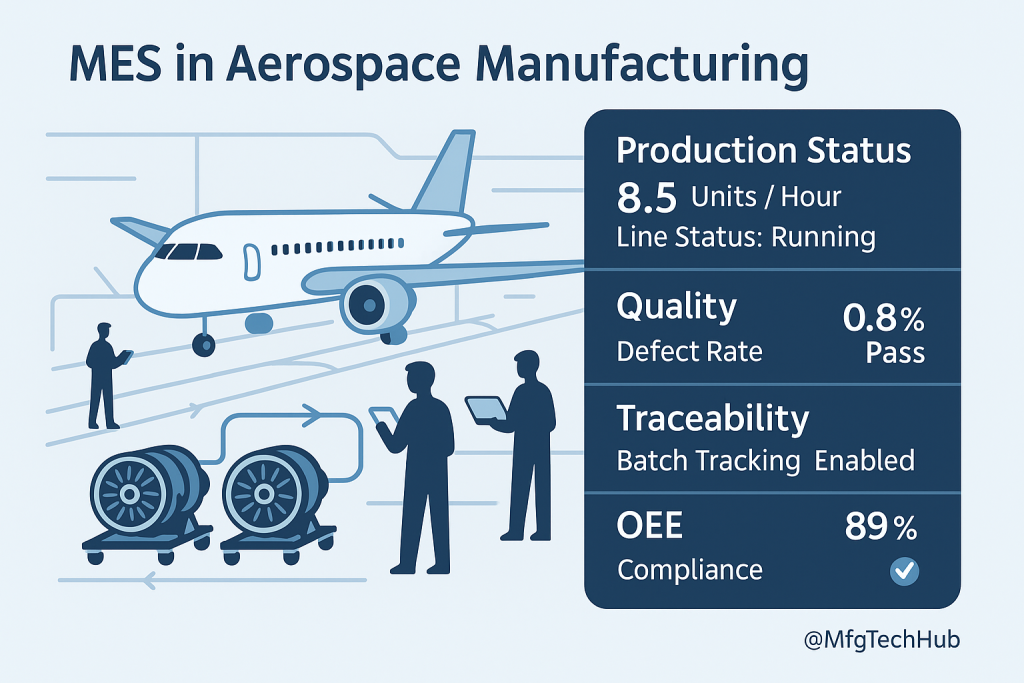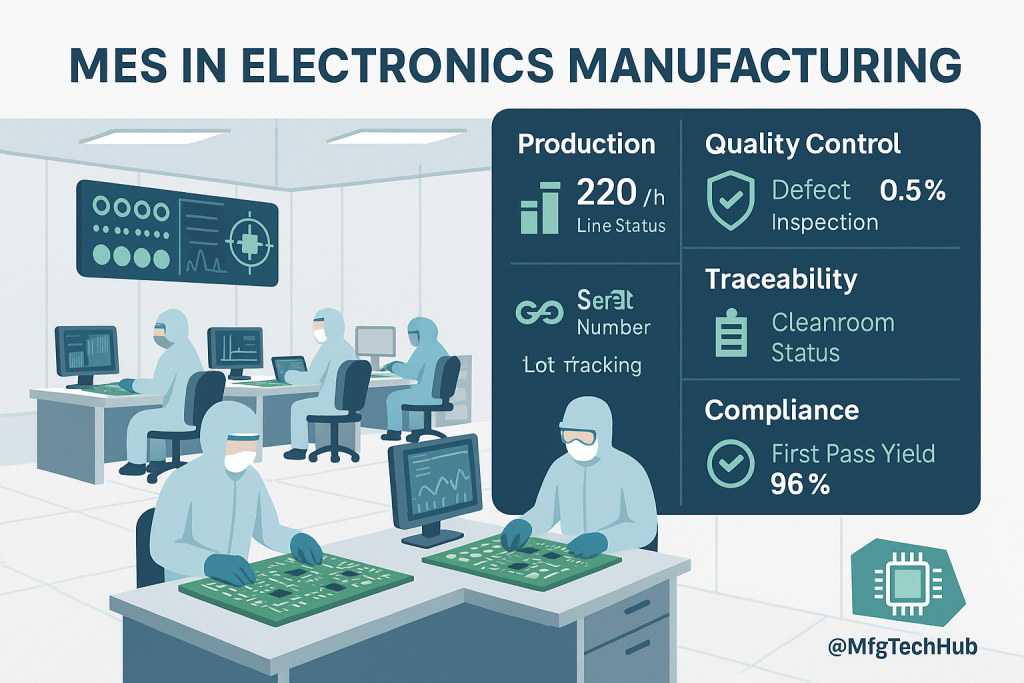MES Applications: Automotive, Aerospace, Electronics
Introduction
Manufacturing Execution Systems (MES) have become a cornerstone of modern industrial operations, especially in sectors where precision, safety, and efficiency are non-negotiable. Among the industries most dependent on MES are automotive, aerospace, and electronics manufacturing. Each sector faces unique challenges — from managing large-scale assembly lines to ensuring strict regulatory compliance and achieving flawless micro-component production. MES acts as the bridge between enterprise-level planning and shop-floor execution, making it possible to achieve real-time visibility, optimize workflows, and deliver products that meet the highest quality standards.
This article explores the role of MES in these three industries, outlining key applications, benefits, and practical examples that demonstrate its impact on operational excellence.
1. MES in the Automotive Industry

Key Applications
- Production Line Management: MES ensures smooth flow across complex automotive assembly lines. From chassis assembly to engine installation and electronic system integration, MES provides real-time status updates, reducing bottlenecks and ensuring efficient coordination.
- Quality Control: Automated checks identify defects in welding, painting, or electronic systems before vehicles leave the line. This prevents costly recalls and ensures compliance with safety and environmental regulations.
- Traceability: MES records each component’s origin, from suppliers to integration. If recalls are necessary, MES helps manufacturers quickly trace and isolate affected batches, minimizing reputational damage and financial loss.
- Inventory Optimization: By aligning parts delivery with real-time production schedules, MES enables just-in-time (JIT) manufacturing, minimizing excess stock while avoiding delays caused by shortages.
Benefits
- Improved efficiency through automated production tracking and error reduction.
- Lower costs due to reduced waste and better inventory synchronization.
- Increased customer trust by consistently delivering high-quality, safe vehicles.
Example
A global automotive giant deployed MES to unify its assembly lines across multiple plants. By enabling real-time production monitoring and automated defect detection, the company cut production errors by 30% and shortened new model time-to-market by nearly 20%. This not only boosted profitability but also enhanced customer satisfaction through faster delivery cycles.
2. MES in the Aerospace Industry

Key Applications
- Custom Order Management: Aerospace manufacturing often involves bespoke designs, from turbine blades to avionics systems. MES manages custom orders by breaking them into trackable workflows, ensuring each step is completed to exact specifications.
- Regulatory Compliance: Aerospace products must meet strict global standards such as AS9100 and FAA regulations. MES automates compliance tracking, maintaining detailed records for audits and ensuring components meet safety certifications.
- Quality Assurance: With integrated checkpoints at every stage, MES detects errors in machining, welding, or component assembly before they escalate. This early intervention reduces rework costs and delays.
- Supply Chain Integration: Given aerospace’s reliance on hundreds of suppliers, MES tracks the journey of each part, ensuring visibility across a complex global supply chain.
Benefits
- Full traceability across highly complex and regulated processes.
- Stronger compliance with global safety and quality standards.
- Improved efficiency through predictive maintenance and real-time monitoring.
Example
A leading aerospace engine manufacturer adopted MES to monitor parts sourced globally. By integrating MES with supplier data and production milestones, the company reduced delays by 25% and ensured 100% compliance with AS9100 standards. This not only improved delivery schedules but also enhanced client trust in safety-critical components.
3. MES in the Electronics Industry

Key Applications
- Precision Manufacturing: Electronics demand micro-level accuracy in assembling circuit boards and semiconductors. MES ensures adherence to exact specifications and maintains precision during mass production.
- Defect Detection: Advanced machine vision and AI-driven quality checks integrated with MES allow immediate detection of faulty soldering, short circuits, or defective chips.
- Inventory and Demand Forecasting: MES integrates with demand forecasting models to align production volumes with market demand, preventing overproduction or shortages.
- Traceability: For highly sensitive products like semiconductors, MES provides complete traceability from wafer fabrication to the final packaged product, enabling rapid recalls if necessary.
Benefits
- Higher yield rates by reducing variability and ensuring process control.
- Lower material waste and improved cost efficiency.
- Better reliability of products critical for consumer and industrial electronics.
Example
An electronics manufacturer specializing in semiconductor chips integrated MES with automated optical inspection systems. This led to a 15% increase in yield rates and a 10% reduction in overall production costs, strengthening their competitiveness in a highly dynamic market.
Conclusion
Whether in automotive, aerospace, or electronics manufacturing, MES plays a transformative role by combining real-time monitoring, predictive insights, and compliance management. In the automotive sector, MES ensures smooth production flow and defect-free vehicles. In aerospace, it safeguards compliance and improves supply chain visibility for highly complex assemblies. In electronics, it supports precision manufacturing and defect detection at microscopic levels.
By embracing MES, manufacturers not only gain operational efficiency but also build resilience against disruptions, achieve regulatory confidence, and deliver products that consistently meet market demands. In industries where a single error can lead to millions in losses or safety risks, MES is no longer optional — it is a strategic necessity for achieving operational excellence in the era of smart manufacturing.
